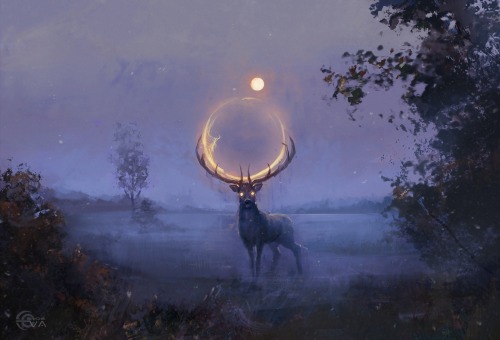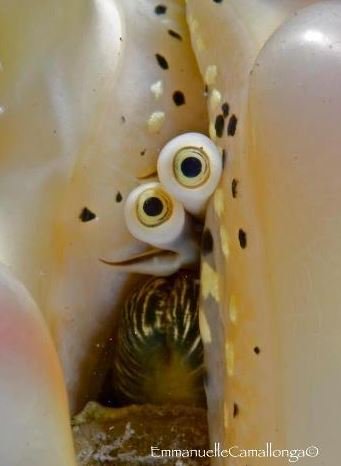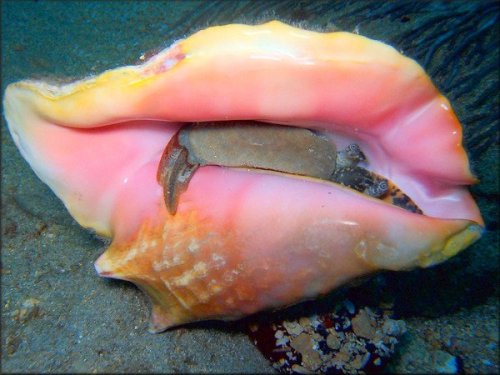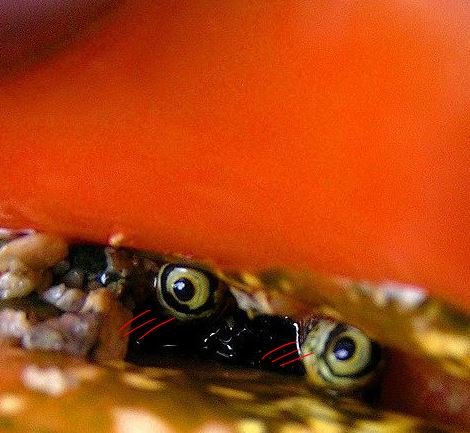Pancake Slug (Leidyula Floridana). Florida, 12/26/18




pancake slug (Leidyula floridana). Florida, 12/26/18
animals really don’t get better than this do they
More Posts from Linruuu and Others





Cute cat who loves shopping in the supermarket. Supermarket rush is in progress.

Away from the flock










Today we learned that conches, the sea-dwelling mollusks who live inside those big, beautiful conch seashells in warm tropical waters, peer out at the world with cartoonish eyes on tiny eyestalks. They see you. They see everything. And what’s more, they can regenerate their peepers should they happen to lose one or both of them.
“One 1976 paper dug into the specific behind these animals’ alien eyestalks. Sitting at the tips of long stalks, they contain retinas with both sensory cells and colored pigment cells. But the story gets weirder because obviously, it gets weirder. After amputating the conchs’ eyes, a fully-formed replacement took its place 14 days later. Humans, we really are losing this evolutionary game.”
But wait, that’s hardly the only surprising set of eyes under the sea. Scallops have eyes too, LOTS of them:


Conch photos by Redditor buterbetterbater and via @shingworks.
[via /r/pics and Gizmodo]



Here are two pics of a kitten with a mustache.
That's all folks, you can keep scrolling.
SOMETHING TO SNOUT ABOUT
you’re wandering across the plains of Mongolia, wondering where the fuck you left your horse. suddenly, the ground shakes! like the beginning of the stampede scene in the Lion King. you hear a distant thunder, as if caused by many hooves! like the stampede scene in the Lion King. you shift anxiously as the noise grows louder, wishing you’d paid more attention to the Disney classics.
suddenly the herd comes over the rise, and you laugh so hard you fall over and are immediately and tragically trampled to death.
surprise! it’s the-


and it’s rude to laugh. (but boy, is it hard not to.)
the Saiga (sigh-guh) is a goat-sized antelope native to the Eurasian steppe. they’re found from the Carpathian Mountains to Mongolia. and they uh, have a bit of a nose situation going on.
and that’s the understatement of the century! the Saiga’s mighty schnozz is its defining feature, and no other hooved animal on earth has such a robust snoot. the Saiga pities their pathetic little faces for it.

that’s a lot of nose to look down. geeze.
so why this immense not-quite-trunk? maybe they use it to make noise, or to intimidate rivals? not so much, actually. both males and females have the tremendous facetrumpet, though females do lack horns and a desire to kill. (but more on that later.)
obviously this big ol clown honker must have some purpose, or it wouldn’t exist. or maybe God was just bored, who nose. (har!) but I kid, this punderful snout actually does have a purpose!

and that purpose is to look ABSOLUTELY STUNNING.
as I mentioned, Saigas are herd animals. and at some point, Evolution decided to provide them with a semi-helpful wedgie. that monster snout helps to filter dust kicked up by their 50ish neighbors out of the air they breathe, as they stumpf semi-majestically across the plains.
it also helps to warm the air they breathe in the cold months, which is an adaptation anyone who’s ever stepped out of their front door directly into a -10 hellzone is surely jealous of. (god, you don’t even know.)

I’m not bitter! I’M NOT.
and they migrate really far! herds of these ridiculous little antelopes can cross thousands of miles, and travel up to 72 miles in a single day! they ford rivers, brave valleys, and scuttle inspiringly across the tundra like they think they’re in a Lifetime movie.
their goal is to reach their seasonal feeding grounds; they spend the winters in the south and the summers in the north. like retirees, except without the tacky golf pants.

BRENDA, HAVE YOU SEEN MY SHORTS.
Saigas eat a wide variety of plants, including some that are toxic to other animals. like goats, Saigas put all of their skill points into the ‘eat anything’ slot. and it seems to have paid off; they were once found across all of Europe and Asia, and even in paleolithic North America! (though the end of the last ice age put a brutal stop to that.)
just imagine being a prehistoric hunter-gatherer and looking out your tent one day to see a moving sea of these ridiculous little muppet antelopes. I bet it was a fun time.

GROK, YOU’LL NEVER GUESS WHAT I’M LOOKING AT RIGHT NOW.
but I did promise I’d get back to the heart-full-of-murder thing, so I guess I’d better do that. Saiga are a lot like other ungulates in that their herds are mostly made up of females, with one attendant male who just kind of hangs out and get poached for his horns sometimes. at least, until breeding season. (DUN DUN DUUUN)
males spend the entire breeding season fighting each other for access to the ladies, which isn’t unusual for a hooved mammal! but what IS unusual is the fatality rate- 90% of these fights end with one male just fucking killing the other. I guess the Saiga ladies are just really into blood sport.

maybe we can get them to just watch Game of Thrones instead like normal people.
but their conservation status is another story altogether. (it’s depressing how many species this is true for. welcome to the Anthropocene, I guess. the geological era where everything sucks.)
around two decades ago, more than a million Saiga wandered across the Eurasian Steppe. but unregulated hunting for food, trophies and the Saiga’s ‘medicinal’ horns decreased their numbers to less than 50,000 in just 10 years. and if that weren’t enough, bacterial infections have been taking huge chunks out of the remaining population: a mass die-off in 2015 killed half of them.
but there is good news: these goofy little hooved bastards are now enjoying governmental protection and conservation efforts to raise their numbers. there are still around 50,000 of them and with luck and maybe a little less murder, these goatish nostril maniacs will be thundering across the plains once more.

(lord willing.)
–
thanks for reading! you can find the rest of the Weird Biology series on my tumblr here, or check out the official archive at weirdbiology.com!
if you enjoy my work, maybe buy me a coffee and support Weird Biology!
and if you’d like to see exclusive Weird Biology content, check out my Patreon today!
–
IMAGE SOURCES
img1- Tim Flach img2- Saiga Conservation Alliance img3- World Atlas img4- elelur.com img5- Andrey Giljov and Karina Karenina img6- Mongabay img7- IUCN img8- LabRoots
CAPTCHA 1: check this box
CAPTCHA 2: select all the rivers
CAPTCHA 3: which of these tiny pictures has an apple in it
CAPTCHA 4: can you find where you went wrong in your life
CAPTCHA 5: select the reasons why my wife left me
What’s a nudibranch, anyway?

These soft-bodied mollusks are closely related to sea slugs!

“Nudibranch” means “naked gills,” referring to the fact that they carry their gills on their back. Here’s a closeup of nudibranch gills:

Many nudibranch species are spectacularly colorful, from the Spanish shawl nudibranch, found in Channel Islands National Marine Sanctuary:

to the opalescent nudibranch of Cordell Bank National Marine Sanctuary, which preys on hydroids and anemones. During digestion, the hydroid and anemone stinging cells actually travel into the nudibranch’s colorful appendages and can be used against the nudibranch’s own predators!

Nudibranchs are found all over the world’s ocean and in many of your national marine sanctuaries.

What’s your favorite kind of nudibranch?
A Giant Sea Turtle
(via)
-
 895blog liked this · 2 months ago
895blog liked this · 2 months ago -
 alfiepod liked this · 3 months ago
alfiepod liked this · 3 months ago -
 bruin-coll reblogged this · 4 months ago
bruin-coll reblogged this · 4 months ago -
 soglasis liked this · 4 months ago
soglasis liked this · 4 months ago -
 sometimes-intelligent liked this · 4 months ago
sometimes-intelligent liked this · 4 months ago -
 pestyparadox reblogged this · 4 months ago
pestyparadox reblogged this · 4 months ago -
 flyinggabriela liked this · 4 months ago
flyinggabriela liked this · 4 months ago -
 bookdragonphoenix reblogged this · 4 months ago
bookdragonphoenix reblogged this · 4 months ago -
 bookdragonphoenix liked this · 4 months ago
bookdragonphoenix liked this · 4 months ago -
 mirmurer liked this · 4 months ago
mirmurer liked this · 4 months ago -
 just-a-ghost-in-the-world reblogged this · 4 months ago
just-a-ghost-in-the-world reblogged this · 4 months ago -
 just-a-ghost-in-the-world liked this · 4 months ago
just-a-ghost-in-the-world liked this · 4 months ago -
 loserboi27 liked this · 4 months ago
loserboi27 liked this · 4 months ago -
 mochi129 reblogged this · 4 months ago
mochi129 reblogged this · 4 months ago -
 mochi129 liked this · 4 months ago
mochi129 liked this · 4 months ago -
 the-splaaash-o7 reblogged this · 4 months ago
the-splaaash-o7 reblogged this · 4 months ago -
 sheerballast reblogged this · 4 months ago
sheerballast reblogged this · 4 months ago -
 fortunatelyannoyingpersona liked this · 4 months ago
fortunatelyannoyingpersona liked this · 4 months ago -
 esqueism liked this · 4 months ago
esqueism liked this · 4 months ago -
 im-a-dragon-cawcaw liked this · 4 months ago
im-a-dragon-cawcaw liked this · 4 months ago -
 jamsjars reblogged this · 4 months ago
jamsjars reblogged this · 4 months ago -
 jamsjars liked this · 4 months ago
jamsjars liked this · 4 months ago -
 alice-in-fandomland reblogged this · 4 months ago
alice-in-fandomland reblogged this · 4 months ago -
 mossgirllibrary liked this · 4 months ago
mossgirllibrary liked this · 4 months ago -
 masqueuedlime liked this · 4 months ago
masqueuedlime liked this · 4 months ago -
 kabber reblogged this · 4 months ago
kabber reblogged this · 4 months ago -
 feral-bookwoom liked this · 4 months ago
feral-bookwoom liked this · 4 months ago -
 bog-bitch liked this · 4 months ago
bog-bitch liked this · 4 months ago -
 monsterfkr liked this · 4 months ago
monsterfkr liked this · 4 months ago -
 monsterfkr reblogged this · 4 months ago
monsterfkr reblogged this · 4 months ago -
 autisticexpression2 reblogged this · 4 months ago
autisticexpression2 reblogged this · 4 months ago -
 1morey reblogged this · 4 months ago
1morey reblogged this · 4 months ago -
 aurinko-inen liked this · 4 months ago
aurinko-inen liked this · 4 months ago -
 persephonaae reblogged this · 4 months ago
persephonaae reblogged this · 4 months ago -
 welp-boi liked this · 5 months ago
welp-boi liked this · 5 months ago -
 paperchamomiles liked this · 5 months ago
paperchamomiles liked this · 5 months ago -
 mentally-moderato reblogged this · 5 months ago
mentally-moderato reblogged this · 5 months ago -
 prospitianescapee reblogged this · 5 months ago
prospitianescapee reblogged this · 5 months ago -
 tempusedax-rerum liked this · 6 months ago
tempusedax-rerum liked this · 6 months ago -
 nyantofromdoodleworld liked this · 6 months ago
nyantofromdoodleworld liked this · 6 months ago -
 varachi-wob-wup liked this · 7 months ago
varachi-wob-wup liked this · 7 months ago -
 athenixs liked this · 7 months ago
athenixs liked this · 7 months ago -
 princess-of-anons reblogged this · 7 months ago
princess-of-anons reblogged this · 7 months ago -
 princess-of-anons liked this · 7 months ago
princess-of-anons liked this · 7 months ago -
 asheratoftheseas liked this · 7 months ago
asheratoftheseas liked this · 7 months ago -
 visceralentertainment reblogged this · 8 months ago
visceralentertainment reblogged this · 8 months ago -
 holetorturer liked this · 8 months ago
holetorturer liked this · 8 months ago -
 farmerpillager liked this · 8 months ago
farmerpillager liked this · 8 months ago -
 sigilsandmotifs reblogged this · 8 months ago
sigilsandmotifs reblogged this · 8 months ago

